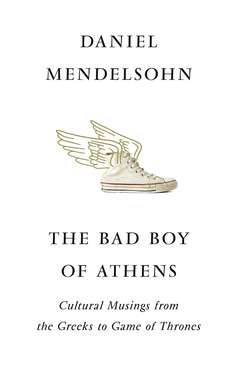The Bad Boy of Athens: Classics from the Greeks to Game of Thrones

Реклама. ООО «ЛитРес», ИНН: 7719571260.
Оглавление
Daniel Mendelsohn. The Bad Boy of Athens: Classics from the Greeks to Game of Thrones
Copyright
Dedication
Contents
Preface
The Robots Are Winning!
Girl, Interrupted
Not an Ideal Husband
The Bad Boy of Athens
Alexander, the Movie!
The Strange Music of Horace
Epic Fail?
The Women and the Thrones
Unsinkable
Not Afraid of Virginia Woolf
White or Grey?
The Two Oscar Wildes
The Tale of Two Housmans
Bitter-Sweet
The Collector
The End of the Road
I, Knausgaard
A Lot of Pain
The American Boy
Acknowledgements
Also by Daniel Mendelsohn
About the Author
About the Publisher
Отрывок из книги
Patrick McGrath,
.....
Some things seem relatively certain, then. But when it comes to Sappho’s personal life – the aspect of her biography that scholars and readers are most eager to know about – the ancient record is confused. What did Sappho look like? A dialogue by Plato, written in the fourth century BC, refers to her as ‘beautiful’; a later author insisted that she was ‘very ugly, being short and swarthy’. Who were her family? The Suda (which gives eight possible names for Sappho’s father) asserts that she had a daughter and a mother both named Kleïs, a gaggle of brothers, and a wealthy husband named Kerkylas, from the island of Andros. But some of these seemingly precious facts merely show that the encyclopedia – which, as old as it is, was compiled fifteen centuries after Sappho lived – could be prone to comic misunderstandings. ‘Kerkylas’, for instance, looks a lot like kerkos, Greek slang for ‘penis’, and ‘Andros’ is very close to the word for ‘man’; and so the encyclopedia turns out to have been unwittingly recycling a tired old joke about oversexed Sappho, who was married to ‘Dick of Man’.
Many other alleged facts of Sappho’s biography similarly dissolve on close scrutiny. Was Sappho really a mother? There is indeed a fragment that mentions a girl named Kleïs, ‘whose form resembles golden blossoms’, but the word that some people have translated as ‘daughter’ can also mean ‘child’, or even ‘slave’. (Because Greek children were often named for their grandparents, it’s easy to see how the already wobbly assumption that Kleïs must have been a daughter in turn led to the assertion that Sappho had a mother with the same name.) Who were the members of her circle? The Suda refers by name to three female ‘students’, and three female companions – Atthis, Telesippa, and Megara – with whom she had ‘disgraceful friendships’. But much of this is no more than can be reasonably extrapolated from the poems, since the extant verses mention nearly all those names. The compilers of the Suda, like scholars today, may have been making educated guesses.
.....